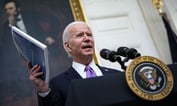 Companies need help even choosing an HSA — one employer, when asked how it picked its HSA, said they selected it because it was across the street and they thought it would be easier for employees to make deposits. (Photo: Shutterstock)
Companies need help even choosing an HSA — one employer, when asked how it picked its HSA, said they selected it because it was across the street and they thought it would be easier for employees to make deposits. (Photo: Shutterstock)
Retirement advisors might be wondering — why get into health savings accounts? Aren’t HSAs the purview of benefits brokers?
Not anymore, said a panel of industry experts at the 2018 NAPA 401(k) Summit in Nashville.
HSAs have an investment capability that’s right in the advisor’s wheelhouse — after all, who should be talking about asset allocations in an HSA? Not a benefits broker.
And advisors are used to educating not only employees, but employers. Apparently it’s needed, based on the panel’s stories. Companies need help even choosing an HSA — one employer, when asked how it picked its HSA, said they selected it because it was across the street and they thought it would be easier for employees to make deposits.
Advisors might also find HSAs worth investigating due to the following:
- HSAs are triple-tax-free vehicles for employees — tax-deductible contributions, tax-free earnings, and tax-free distributions.
- Enrolling somebody in a 401(k) is an opportunity for a one-time conversation — but if you enroll them in an HSA, you see them every year at enrollment time.
- HSAs provide the opportunity to offer another service to employers while also adding assets under management.
Why now?
The HSA conversation is changing. Advisors are changing. “Two years ago the conversation was ‘what is an HSA?’ Now we know and we know the impact on employees and their retirement prospects,” said panel moderator Ryan Tiernan, national accounts manager at American Funds.
In the past, implementing an HSA for an employer meant simply ticking the boxes. Now it’s an educational process, helping to show how HSAs work and why they’re important. “Employers are pleasantly surprised I have the knowledge. They want to talk about it,” Jamie Greenleaf, general partner/principal at Cafaro Greenleaf, said.
Where health insurance and retirement plans were siloed in the past, HSAs are the link between health care and finance. “The future of this is looking at annual benefits enrollment as not a health care decision but a financial decision,” Ken Forsythe, Empower’s assistant vice president, Product Strategy, said.








 April 16, 2018 at 07:57 AM
April 16, 2018 at 07:57 AM











 Copyright © 2024 ALM Global, LLC. All Rights Reserved.
Copyright © 2024 ALM Global, LLC. All Rights Reserved.